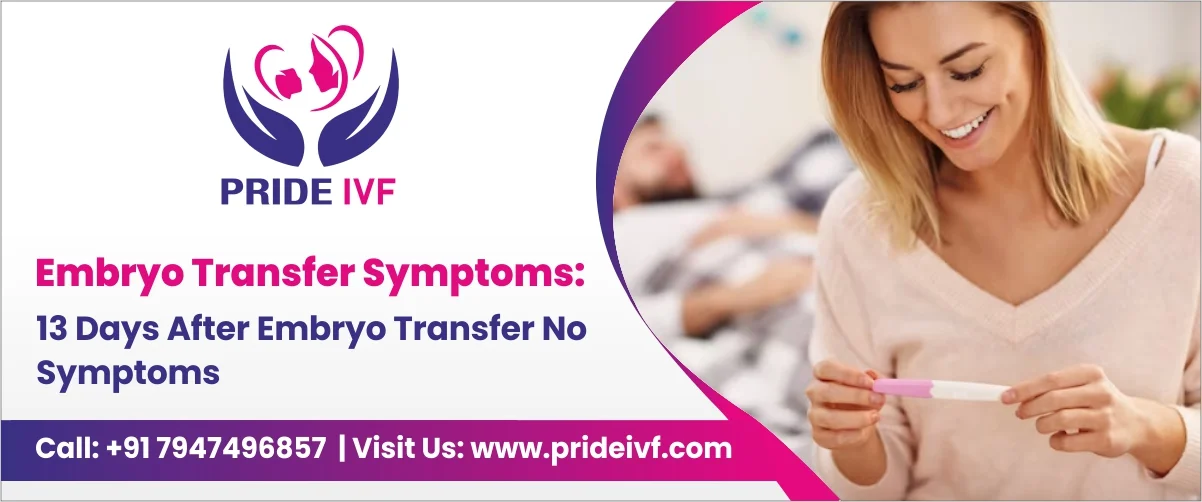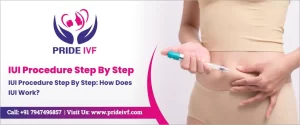The journey of assisted reproductive technology, often referred to as ART, is a path many individuals and couples embark on in the pursuit of parenthood. One of the pivotal steps in this journey is embryo transfer. It’s a moment filled with hope, anxiety, and anticipation.
In the days that follow, many people become hyper-aware of their bodies, scrutinizing every sensation, hoping for a sign that the procedure was a success. However, what happens when you find yourself 13 days after embryo transfer with no symptoms? The absence of symptoms during this critical waiting period can be unnerving, but it’s essential to remember that every journey is unique. At the International Pride IVF Centre in Delhi, we understand the complexities and emotions that come with the IVF journey.




Understanding Embryo Transfer
Before we delve into the intricacies of embryo transfer symptoms (or the lack thereof), it’s important to understand the significance of ivf process step by step. Embryo transfer is a crucial step in in-vitro fertilization (IVF), a process that offers hope to those struggling with infertility.
During this procedure, one or more fertilized embryos are transferred into the uterus, with the hope that they will implant and result in a successful pregnancy. It’s a moment that marks the culmination of weeks or even months of emotional and physical preparation.
The 2-Week Wait
Following embryo transfer, there’s a waiting period often referred to as the “two-week wait.” This is a time of heightened emotions and, sometimes, heightened symptoms. Many women find themselves scrutinizing every sensation in their bodies, wondering if they are experiencing early signs of pregnancy.
After embryo transfer day by day symptoms during this period include implantation bleeding, breast tenderness, fatigue, and mild cramping. These signs can bring a mix of hope and anxiety as they are interpreted as possible indicators of a positive outcome.
Possible Symptoms After Embryo Transfer
Implantation bleeding, often confused with a light period, occurs when the embryo attaches itself to the uterine lining. Breast tenderness is another symptom commonly reported, driven by hormonal changes. Fatigue may be attributed to the body’s energy investment in the early stages of pregnancy, and mild cramping can occur as the uterus adjusts to its new resident.
Experiencing these symptoms can be reassuring, offering some validation for the emotional rollercoaster that is the two-week wait. But what if you find yourself on the other side of this spectrum, with no symptoms to speak of?
|
Day |
Symptoms |
| Day 1 To Day 2 | No specific symptoms |
| Day 3 To Day 4 | – Mild cramping |
| – Spotting | |
| Day 5 To Day 6 | – Cramping and bloating |
| – Spotting | |
| Day 7 To Day 8 | – Breast sensitivity |
| – Fatigue | |
| – Cramping and back pain | |
| Day 9 To Day 10 | – Increased breast tenderness |
| – Nausea | |
| – Increased urination | |
| Day 11 To Day 12 | – Darkened areolas |
| – Heightened sense of smell | |
| – Mood swings | |
| Day 13 To Day 14 | – Missed period |
| – Positive pregnancy test | |
| – Continued symptoms (breast tenderness, nausea, fatigue) |
Note: Remember, these symptoms are general and may vary from person to person. It’s crucial to consult with your healthcare provider for personalized advice and guidance during this time.
13 days after embryo transfer no symptoms
The Anxiety of No Symptoms
The absence of symptoms during the two-week wait can be a source of great anxiety. As someone who has gone through this myself, I understand the rollercoaster of emotions that accompanies each day without signs of pregnancy. It’s easy to become consumed by thoughts of, “Why am I not feeling anything? Does this mean it didn’t work?”
The truth is, the absence of symptoms doesn’t necessarily indicate a negative outcome. Every person’s body responds differently to the IVF process, and individual variations are entirely normal. Moreover, the medications you are taking during this time can sometimes mask or mimic pregnancy symptoms, further complicating the interpretation.
Also Read: After Embryo Transfer Diet Chart
Reasons for the Absence of Symptoms
There are several reasons why some individuals may not experience any symptoms 13 days after embryo transfer. These factors include hormonal variations, individual differences in perception of symptoms, and the influence of medications used during IVF.
Hormonal fluctuations play a significant role in the absence or presence of symptoms. In some cases, hormone levels might not have reached the threshold required to trigger noticeable changes in the body. Furthermore, some individuals may simply not be as attuned to subtle changes or may be experiencing symptoms that are less pronounced.
The medications used in IVF, including progesterone supplements, can also influence the way you feel during the two-week wait. These medications are known to mimic some early pregnancy symptoms, making it even harder to differentiate between medication side effects and genuine pregnancy signs.
The Importance of Staying Calm
The two-week wait can be an emotional minefield, particularly when you’re not experiencing any symptoms. However, it’s crucial to manage stress and anxiety during this period. High-stress levels can negatively impact your overall well-being and potentially affect the outcome of your IVF cycle. Here are some strategies to help you stay calm:
- Relaxation Techniques: Incorporate relaxation techniques like deep breathing, meditation, or yoga into your daily routine.
- Support System: Lean on your support system, whether it’s a partner, friend, or online IVF community. Sharing your feelings and fears can be therapeutic.
- Distract Yourself: Engage in activities you enjoy to keep your mind occupied. Read a book, watch movies, or take up a hobby to redirect your focus.
- Avoid Dr. Google: Resist the urge to constantly search for symptoms or IVF success rates or stories online. It can be overwhelming and counterproductive.
- Stay Positive: Remind yourself that every journey is unique, and a lack of symptoms does not necessarily equate to a negative outcome.
- Patience is Key: Understand that it may take time for symptoms to manifest or for a pregnancy test to yield accurate results.
- Trust the Process: Remember that you are in the hands of skilled healthcare professionals who are guiding you through this journey.
When to Take a Pregnancy Test?
The burning question for many during the two-week wait is, “When should I take a pregnancy test?”. The answer is 11 Days After Embryo Transfer Pregnancy Test, but it’s important to note that testing too early can lead to inaccurate results and unnecessary anxiety. The timing of the test is critical for its accuracy.
Typically, it’s advisable to wait until at least 10-14 days after embryo transfer before taking a home pregnancy test. Testing too early, before the hCG (human chorionic gonadotropin) hormone has had time to build up in your system, can result in a false negative. Your healthcare provider will provide guidance on the ideal testing window based on your specific treatment plan.
Lets get started
The Verdict: Testing Positive or Negative
When the day arrives to take the pregnancy test, the emotions can be overwhelming, regardless of the outcome. If the test is positive, joy, relief, and gratitude may flood your heart. If it’s negative, you may feel sadness, disappointment, and frustration. Both reactions are valid and entirely normal.
It’s important to remember that a negative test result does not signify the end of your journey. Discuss the results with your healthcare provider, who can offer guidance on the next steps and potential adjustments to your treatment plan.
Seeking Medical Advice
Regardless of the test result, it’s essential to consult with your healthcare provider. They can provide clarity on the situation and address any concerns or questions you may have. Personalized medical advice and guidance are invaluable during this journey.
Conclusion
In conclusion, the 13 days after embryo transfer no symptoms can be a challenging period filled with anxiety and uncertainty. However, it’s essential to remember that every journey is unique, and the absence of symptoms does not necessarily indicate a negative outcome.
Managing stress, staying positive, and seeking medical advice when needed are the key components of navigating this emotional rollercoaster.
Our dedicated team is here to support you every step of the way, providing personalized care and guidance to help you achieve your dream of parenthood.
If you have any questions or would like to explore your options further, don’t hesitate to reach out to us. Your journey is our priority, and we are here to provide the support and expertise you need.
Contact the International Pride IVF Centre today to take the next step towards building your family.




